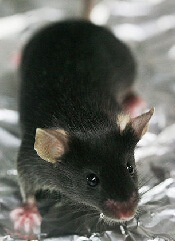User login

Preclinical data suggest that blocking the Rho-associated coiled-coil kinase 2 (ROCK2) signaling pathway with the ROCK2 inhibitor KD025 can ameliorate chronic graft-versus-host disease (cGVHD).
Previous studies have shown that IL-21 and IL-17, 2 pro-inflammatory cytokines regulated by the ROCK2 signaling pathway, play a key role in cGVHD pathogenesis.
In the new study, targeted ROCK2 inhibition with KD025 had a therapeutic effect on cGVHD cytokines and signaling pathways involved in the pathogenesis of cGVHD.
Bruce R. Blazar, MD, of the University of Minnesota in Minneapolis, and his colleagues reported these findings in Blood.
The research was supported by Kadmon Corporation, LLC, the company developing KD025, as well as other sources.
The researchers found that KD025 reversed the clinical and immunological symptoms of cGVHD in 2 murine models: a full major histocompatibility complex (MHC)-mismatch model of multi-organ system cGVHD with bronchiolitis obliterans syndrome and a minor MHC-mismatch model of sclerodermatous GVHD.
Mice treated with KD025 showed improvements in pulmonary function and had a significant decrease in cGVHD pathology in the lung, liver, and spleen, when compared to vehicle-treated animals.
In addition, KD025 treatment did not affect the graft-versus-leukemia effect or immune response to viral pathogens.
In both animal models, KD025 treatment downregulated phosphorylation of STAT3, a pro-inflammatory signaling pathway that plays a key role in the development of cGVHD.
In human cells, KD025 inhibited the production of IL-21, IL-17, and IFN-γ. The drug also decreased STAT3 activity.
In both murine and human cells, KD025 downregulated STAT3 phosphorylation and simultaneously upregulated STAT5 phosphorylation, thereby reducing cGVHD progression.
“These data demonstrate that ROCK2 inhibition decreases cGVHD manifestation in murine and human models, which correlates with a demonstrated effect on molecular signaling pathways responsible for cGVHD pathogenesis,” Dr Blazar said.
Based on these results, Kadmon is planning to initiate a phase 2 study of KD025 for the treatment of cGVHD in mid-2016. The drug has already been tested in phase 1 studies of healthy volunteers. ![]()

Preclinical data suggest that blocking the Rho-associated coiled-coil kinase 2 (ROCK2) signaling pathway with the ROCK2 inhibitor KD025 can ameliorate chronic graft-versus-host disease (cGVHD).
Previous studies have shown that IL-21 and IL-17, 2 pro-inflammatory cytokines regulated by the ROCK2 signaling pathway, play a key role in cGVHD pathogenesis.
In the new study, targeted ROCK2 inhibition with KD025 had a therapeutic effect on cGVHD cytokines and signaling pathways involved in the pathogenesis of cGVHD.
Bruce R. Blazar, MD, of the University of Minnesota in Minneapolis, and his colleagues reported these findings in Blood.
The research was supported by Kadmon Corporation, LLC, the company developing KD025, as well as other sources.
The researchers found that KD025 reversed the clinical and immunological symptoms of cGVHD in 2 murine models: a full major histocompatibility complex (MHC)-mismatch model of multi-organ system cGVHD with bronchiolitis obliterans syndrome and a minor MHC-mismatch model of sclerodermatous GVHD.
Mice treated with KD025 showed improvements in pulmonary function and had a significant decrease in cGVHD pathology in the lung, liver, and spleen, when compared to vehicle-treated animals.
In addition, KD025 treatment did not affect the graft-versus-leukemia effect or immune response to viral pathogens.
In both animal models, KD025 treatment downregulated phosphorylation of STAT3, a pro-inflammatory signaling pathway that plays a key role in the development of cGVHD.
In human cells, KD025 inhibited the production of IL-21, IL-17, and IFN-γ. The drug also decreased STAT3 activity.
In both murine and human cells, KD025 downregulated STAT3 phosphorylation and simultaneously upregulated STAT5 phosphorylation, thereby reducing cGVHD progression.
“These data demonstrate that ROCK2 inhibition decreases cGVHD manifestation in murine and human models, which correlates with a demonstrated effect on molecular signaling pathways responsible for cGVHD pathogenesis,” Dr Blazar said.
Based on these results, Kadmon is planning to initiate a phase 2 study of KD025 for the treatment of cGVHD in mid-2016. The drug has already been tested in phase 1 studies of healthy volunteers. ![]()

Preclinical data suggest that blocking the Rho-associated coiled-coil kinase 2 (ROCK2) signaling pathway with the ROCK2 inhibitor KD025 can ameliorate chronic graft-versus-host disease (cGVHD).
Previous studies have shown that IL-21 and IL-17, 2 pro-inflammatory cytokines regulated by the ROCK2 signaling pathway, play a key role in cGVHD pathogenesis.
In the new study, targeted ROCK2 inhibition with KD025 had a therapeutic effect on cGVHD cytokines and signaling pathways involved in the pathogenesis of cGVHD.
Bruce R. Blazar, MD, of the University of Minnesota in Minneapolis, and his colleagues reported these findings in Blood.
The research was supported by Kadmon Corporation, LLC, the company developing KD025, as well as other sources.
The researchers found that KD025 reversed the clinical and immunological symptoms of cGVHD in 2 murine models: a full major histocompatibility complex (MHC)-mismatch model of multi-organ system cGVHD with bronchiolitis obliterans syndrome and a minor MHC-mismatch model of sclerodermatous GVHD.
Mice treated with KD025 showed improvements in pulmonary function and had a significant decrease in cGVHD pathology in the lung, liver, and spleen, when compared to vehicle-treated animals.
In addition, KD025 treatment did not affect the graft-versus-leukemia effect or immune response to viral pathogens.
In both animal models, KD025 treatment downregulated phosphorylation of STAT3, a pro-inflammatory signaling pathway that plays a key role in the development of cGVHD.
In human cells, KD025 inhibited the production of IL-21, IL-17, and IFN-γ. The drug also decreased STAT3 activity.
In both murine and human cells, KD025 downregulated STAT3 phosphorylation and simultaneously upregulated STAT5 phosphorylation, thereby reducing cGVHD progression.
“These data demonstrate that ROCK2 inhibition decreases cGVHD manifestation in murine and human models, which correlates with a demonstrated effect on molecular signaling pathways responsible for cGVHD pathogenesis,” Dr Blazar said.
Based on these results, Kadmon is planning to initiate a phase 2 study of KD025 for the treatment of cGVHD in mid-2016. The drug has already been tested in phase 1 studies of healthy volunteers. ![]()